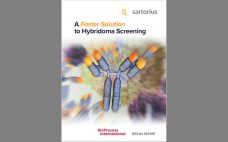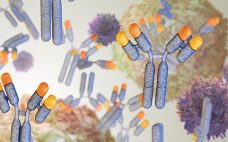In an Ask-the-Expert webinar on 16 May 2019, Xuemei He (R&D manager of chromatography media chemistry at Bio-Rad Laboratories, Inc.) introduced the Nuvia aPrime 4A mixed-mode chromatography resin. Its macroporous particles exhibit good pressure-flow properties in addition to optimal ligand density and hydrophobicity. So this versatile resin offers effective separation of target from impurities in both flow-through and bind–elute modes, with good recovery of target proteins under gentle purification condition. He’s Presentation The resin is a hydrophobic anion exchanger with positively…
Sponsored Content
Ask the Expert: The MYCAP CCX System: Expand Outside the Hood
Charles Meadows (product manager at Sartorius Stedim Biotech) joined BPI for an Ask-the-Expert webinar on 13 June 2019 featuring the MYCAP CCX cell culture expansion system. He showed how a closed aseptic cell expansion process can decrease the rate of batch failure from contamination, in turn reducing waste and overhead costs. Meadows’s Presentation Contamination is an inherent risk of open cell culture expansion systems. Each passage from one flask to the next potentially exposes cellular material. A recent BioPlan Associates…
Ask the Expert: Efficient Technology Transfer: A CDMO Perspective
Effective transfer of technology from a sponsor facility to a contract development and manufacturing organization (CDMO) is essential to rapid biomanufacturing, especially for early and late-stage clinical supply. But the process is not as simple as “plug and play.” In an Ask-the-Expert webinar on 25 June 2019, Roy Sevilla (senior manager of upstream process development at Avid Bioservices) explained how his company orchestrates transfer operations with cross-functional teams. Strong, frequent collaboration with process sponsors ultimately mitigates risks associated with scale-up,…
Ask the Expert: Developability: Evaluating Specificity, Immunogenicity, Functionality, and Manufacturability for Lead Candidate Selection
Campbell Bunce (chief scientific officer at Abzena) joined BPI for an Ask-the-Expert webinar on 21 May 2019 to discuss his company’s approach to developability assessment, an increasingly popular way to identify leading drug candidates. Bunce explained what developability assessment is and how Abzena uses it to identify candidate liabilities and manage both clinical and financial risk during key stages of drug development. Bunce’s Presentation The high attrition rate of drug candidates from discovery to clinical proof-of-concept is well known. The…
Ask the Expert: GMP Flow Cytometry: Applications, Considerations, and Challenges
On 31 July 2019 Jamie Hall (project manager at Intertek Pharmaceutical Services) joined BPI for an “Ask the Expert” webinar to explore key applications and considerations for implementing flow cytometry (FC) methods in a GMP environment. This increasingly important technique can be applied to all stages of drug development in a range of applications, including cell-line identification, immunophenotyping, and cell-based potency assays. In a regulatory environment, such flexibility can present challenges. Hall explained how scientists can approach FC method development…
A Faster Solution to Hybridoma Screening
Monoclonal antibodies are a rapidly growing class of therapeutics and are used in multiple clinical indications. This highly competitive landscape necessitates the need for rapidly developing next generation antibodies against new challenging targets with improved mechanism of action and pharmacokinetics. Current antibody screening tools such as ELISA, only report on binding to one antigen target at a time; hence these assays are time consuming and require large amounts of target protein. This case study highlights how the Intellicyt® iQue3 system…
Gyrolab Immunoassays: Streamlining Workflows Through Automation
Immunoassays and other types of ligand-binding assays are widely used in the development of monoclonal antibody (mAb) therapeutics to measure antibody titers and support downstream purification processes by tracking impurities such as host cell proteins (HCPs) and leakage of protein A from affinity chromatography columns. While scaled down bioprocess development models and high-throughput testing generate large numbers of samples for analysis, immunoassays remain largely manual in many companies, resulting in high assay variability and low productivity. In contrast, automated immunoassays…
Automated, Closed-Loop, Inline Monitoring of CAR-T Cells in a Production Process
This webcast features: Jan Van Hauwermeiren, VP Sales and Marketing, Ovizio Imaging Systems Cell-based technology is a fundamental pillar of modern biotechnology. With the development of cell therapy products (CTPs), there is an increased need for robust and validated measurements for cell characterization to enable manufacturing control and a safe, high-quality product released to the patients. Our company has developed an inline, automated microscope that generates reliable viable cell counts (VCCs) without the need for active sampling, in real time…
Navigating Regulatory Expectations for Extractables and Leachables of Combination Products
This webcast features: Sandi Schaible, Senior Director, Analytical Chemistry and Regulatory Toxicology, WuXi AppTec The expectations for extractables and leachables of medical devices (delivery systems) are different than those of typical pharmaceutical applications such as container closure systems or single use systems. Learn about how the FDA reviews combination products and learn about testing expectations. Put these expectations to practice with a case study review complete including common pitfalls in testing. Key lessons learned: How does the FDA interact internally…
Streamlining the Antibody Discovery Workflow at ModiQuest Research
With breakthroughs in molecular engineering and antibody humanization, monoclonal antibodies (mAbs) are one of the fastest-growing classes of biopharmaceuticals for most clinical indications. In 2017, 10 therapeutic monoclonal antibodies were approved in the EU or US with nine additional candidates under regulatory review and 60 in phase III clinical trials 1. mAbs are the backbone of many treatment modalities including unconjugated therapeutic antibodies, antibody drug conjugates, bispecific antibodies and CAR-T cell therapy. Many of the approved antibody drugs engage the…




